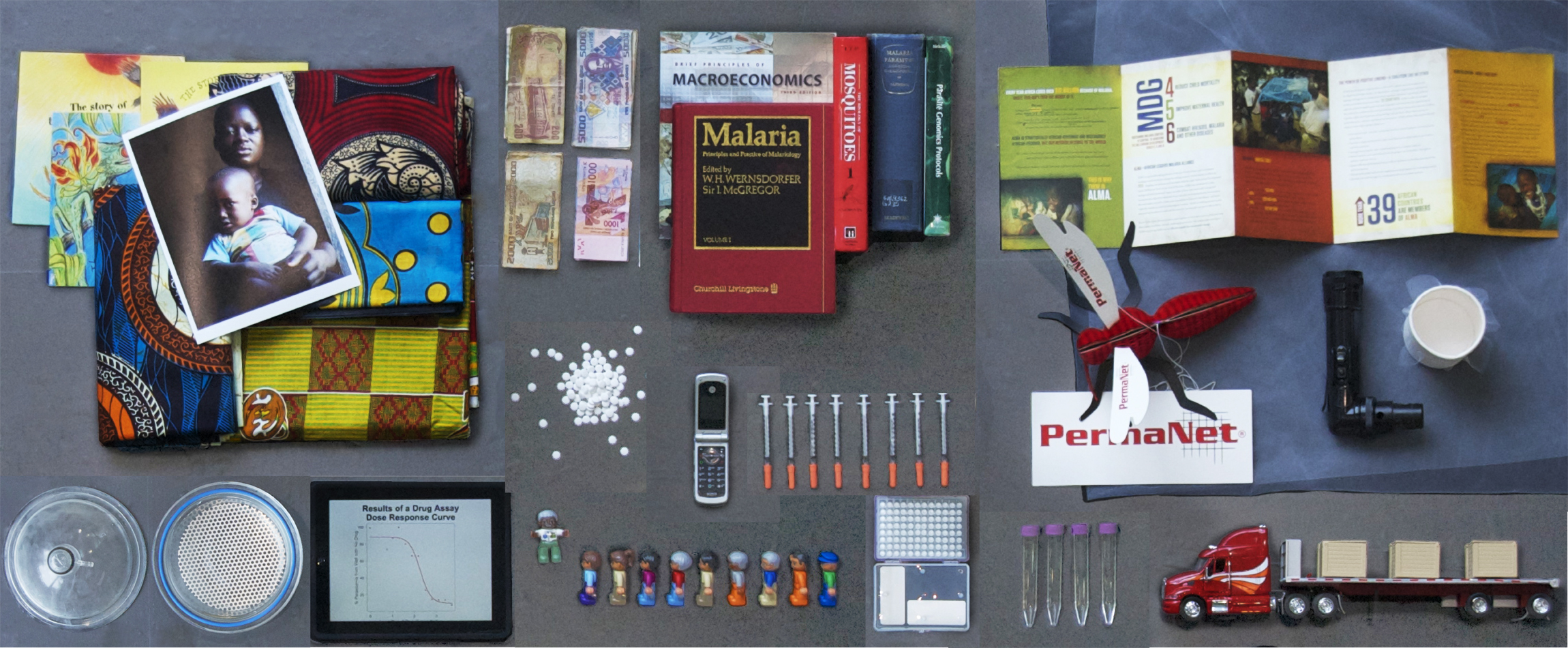This session will address the paradigm shift from reducing disease morbidity to preventing malaria transmission.
Learning Objectives
- To understand the different targets and approaches needed to interrupt malaria transmission: to reduce the reservoir of infection or to bring the basic reproductive rate to below 1.
- To gain a general overview of new tools and strategies needed for malaria eradication: drugs, vaccines, vector control, diagnoses, health systems, operational research, monitoring/evaluation, surveillance, modeling, basic science, and related cross-cutting issues.
- To gain an understanding of key international alliances and global initiatives to the science of malaria elimination and eradication: the Malaria Eradication Research Agenda (malERA) and Malaria Eradication Scientific Alliance (MESA).

This session will provide an introduction to malaria biology, including a rigorous approach to the basic and applied issues related to malaria. Areas covered in detail include malaria epidemiology, parasite-vector relationships, vector control, cell biology, and biochemistry of the parasite red cell interaction, drug action and resistance mechanisms, parasite genetics and cell biology.
Learning Objectives
- To understand the biology and life cycle-basis for this disease, including global public health aspects of malaria.
- To understand the incidence and distribution of infection and disease within human populations; determinants of frequency and distribution; methods of measurement; magnitude and consequence of disease on the population.
- To consider the interrelationship of organisms and their environments, including identify ways of reducing the incidence and/or severity of disease within populations; obstacles; consequences.
- To understand behavioral change as an intervention.
- To possess a historic perspective while appreciating recent developments in the field.
This session will provide a historical overview of the Smallpox eradication program, including lessons learned. It will also outline a brief history of the Polio eradication program as well as the Measles Elimination and Mortality Control Initiatives. The lessons learned from all of these campaigns are central to the rejuvenated malaria eradication program.
Learning Objectives
- The commonalities among disease eradication initiatives – lessons learned.
- The specifics of each disease eradication or elimination program.
- The role of research in disease control, elimination and eradication efforts.
- “The last mile”, the biggest hurdle of all.

This session will provide a historical overview on the theory and practice of disease eradication programs over the course of the 20th and early 21st century.
Learning Objectives
- To become familiar with the formation of the concepts and practices of disease eradication over the 20th century, with attention to both successes and failures.
- To balance attention to the technological, managerial, and etiological dimensions of eradication programs with attention to the social, economic, and ecological determinants of their outcomes.
- To utilize historical analysis as a tool for policy making in present-day global public health.
This session will provide an overview of lifecycle of the parasite Dracunculus medinensis, interventions and strategy of the Guinea Worm Eradication Program, history, successes and current challenges of the ‘final inch.’
Learning Objectives
- To understand behavioral change as an intervention.
- To understand village-based interventions using volunteers.
- To gain insight on the importance of high-level political support.
This session will outline the key features of malaria epidemiology, as relevant for both control and elimination/eradication.
Learning Objectives
- To understand the essential concepts and measures of malaria epidemiology.
- To understand the relevance of key malaria epidemiological features for disease control.

This session will consist of an interactive review of the campaign to eradicate the vector of urban yellow fever from the Americas. Historical details will be presented with particular attention to strategy and debate. Students will be asked to share their opinions regarding the applicability of the issues discussed to current disease eradication efforts.
Learning Objectives
- To understand historical components of disease eradication.
- To understand barriers and facilitators in disease eradication campaigns.
- To gain a better understanding of historical issues and its application to current strategies for disease eradication.

This session will discuss the successes and failures of the previous World Health Organization malaria eradication campaign and other relevant campaigns, such as smallpox, polio, and guinea worm.
Learning Objectives
- To understand the variety of challenges posed by undertaking a campaign for disease eradication: scientific, operational, biological, and political.
- To review the specific case of the malaria eradication campaign, its successes and pitfalls.
- To highlight the importance of maintaining research and development efforts until the final objective is achieved.
- To learn from specific examples and to be prepared to “expect the unexpected”.
This session will address historical and current resistance emergence and its consequences for malaria control and elimination.
Learning Objectives
- To assess past and current uses of drugs for control and elimination, both for treatment and prophylaxis.
- To review the history of the emergence and spread of Chloroquine (CQ) resistance.
- To know the new drugs for treatment (artemisinin-combination therapies or ACTs) and prophylaxis (e.g., Intermittent Preventive Treatment in pregnancy or IPT, Intermittent Preventive Treatment of malaria in infants or IPTi, Seasonal malaria chemoprevention or SMC, and Mass Drug Administration or MDA).
- To understand current efforts to prevent and contain the emergence of resistance.
- To assess the role of drugs for malaria eradication: the concept of a Single Encounter Drug for Radical Cure and Prophylaxis (SERCAP).
This session will provide an overview of different aspects of mosquito biology that are essential to parasite development and transmission.
Learning Objectives
- To gain an understanding of vector distributions and the complexity of malaria transmission.
- To gain an understanding of the biological features shaping the vectorial capacity of Anopheles mosquitoes.
- To gain insight and knowledge of the genetics of vector-parasite interactions.
This session will review the epidemiological and operational features of the three main vector control tools: insecticide treated nets, indoor residual spraying and larviciding.
Learning Objectives
- To understand the essential concepts and epidemiological features of ITNs, IRS and larviciding.
- To understand the comparative operational strengths and weaknesses if ITNs, IRS and larviciding as malaria control interventions.
This session will discuss the conceptual shift for developing vaccines the interrupt malaria transmission.
Learning Objectives
- To foresee potential approaches to interrupt malaria transmission through the use of vaccines, not only targeting the sexual and mosquito stages but also pre-erythrocytic, and asexual stages, and/or disrupting the parasite development in the mosquito, including both P. falciparum malaria and P. vivax malaria.
This session will provide an overview of the current state of malaria diagnostics and describe new technologies and strategies to achieve and maintain malaria eradication.
Learning Objectives
- To understand the current state of malaria diagnostics
- To understand new evolving technologies for malaria diagnostics.
- To understand key knowledge gaps or limitations in existing technologies and evaluate future strategies to achieve and maintain eradication.

This session will address the specificities of malaria monitoring, evaluation and surveillance as programs approach the very last malaria cases.
Learning Objectives
- To understand the conceptual shift from measuring morbidity and mortality to detecting infections (with or without symptoms) and measuring transmission.
- To conceptualize surveillance as a key intervention for malaria eradication, through the capacity to assess trends and respond without delay to potentially conflictive situations.
This session will review the evidence on the economic impact of malaria, as well as the returns to reducing the burden of malaria.
Learning Objectives
- To understand the correlation between malaria and economic growth at the country level.
- To understand the mechanisms through which malaria can affect individual productivity and economic growth in the medium to long-run.
This session provides an opportunity to examine the role of business in the response to basic public responsibilities, such as healthcare and malaria eradication. In developing countries with public sectors that are permanently resource-constrained and at a time when development assistance from a developed world in deep recession have become even scarcer, the question has become even more relevant and timely. In this context:
- Is it feasible to provide high social impact goods and services to the majority of the population and simultaneously earn commercially attractive returns?
- What is the role of profit in the delivery of goods and services basic to society? Should essential goods and services be restricted to the public sector?
- If commercial delivery of essential goods (such as healthcare) to low income populations is present, how should it be regulated? Should there be a cap on profits? If so, how should it be determined?
Malaria is a complex disease that requires a multidisciplinary approach to comprehensively describe determinants of local transmission. This session will go beyond the human-parasite-vector discussion to address social factors that impact the local patterns of transmission. The session will also discuss how these factors could be addressed with alternative control strategies that combine community sensitization and educational approaches (among others).
Learning Objectives
- To highlight key social factors that impact the pattern and the level of local malaria transmission.
- To discuss possible strategies that could be incorporated into malaria control efforts to address these social factors.
- To review which of these possible strategies have been implemented in the past and the extent to which they were successful.
This session will discuss the radical transformation that is taking place in the media marketplace, and examine the implications of this transformation for behavior change communication and policy advocacy for malaria prevention and control.
Learning Objectives
- To understand the challenges of operating effectively in the brave new world of health communication.
- To glean insights into new approaches to health communication.
Students will analyze a case from Rwanda on malaria control.
Learning Objectives
- How do decision-makers prioritize interventions (prevention and treatment)?
- How to evaluate the success of a program.
- How to bring programs to scale.
This session will focus on West Africa with the Akan of Ghana as a case study. We will combine environmental, historical, and cultural perspectives for a deeper understanding of the social context of malaria and societal responses to an endemic disease.
Learning Objectives
- To emphasize the social and cultural context of disease, local therapies, and how societies make adjustments for endemic diseases.
- To utilize one historical attempt to eradicate malaria in Ghana during World War II to explore a British-American eradication endeavor in a very different cultural context.
This session will address the structural and functional interactions of malaria elimination/eradication programs with existing health services.
Learning Objectives
- To understand the structural and functional interactions between malaria elimination/eradication programs and existing health services.
- To understand that the integration of malaria elimination/eradication activities is both essential for the achievement of this ambitious goal and a unique chance to build stronger and more equitable health services.
18:30-19:00
Reception
East Dining Room
19:00-19:45
Welcome Message & Dinner
Professor Nava Ashraf, Harvard Business School and Professor Günther Fink, Harvard School of Public Health
Library, 2nd Floor
19:45-20:45
Q&A
Honorable Dr. Joseph Kasonde, Minister of Health of Zambia
Moderated by Professor Dyann Wirth, Chair, Department of Immunology and Infectious Diseases, Harvard School of Public Health
20:45-20:55
Closing Remarks
Professor Pedro Alonso, Director, Barcelona Center for International Health Research, and Chair, MalERA
21:00
Adjourn
Sponsored by:
![]()

Mathematical models of malaria have been used for more than 100 years as a tool to facilitate the understanding of malaria transmission dynamics. This session will briefly review the evolution and state of modeling strategies, and discuss the extent to which these models have been (and will potentially be) used to inform malaria control, and elimination/eradication approaches.
Learning Objectives
- To review the evolution of mathematical models of malaria.
- To discuss past contributions of mathematical models to malaria control efforts.
- To understand the role of and challenges for mathematical models in the current efforts of malaria elimination/eradication.
These sessions will review in detail three real-life elimination case studies, identifying strengths and weaknesses, and proposing realistic solutions to address the latter.
Learning Objectives
- To expose students to three real-life malaria elimination situations through structured as well as documented case studies.
- To improve students’ analytical understanding of key challenges for malaria elimination in three geographically different settings.
- To improve students’ understanding of pragmatic solutions for the current challenges to malaria elimination.
These sessions will review in detail three real-life elimination case studies, identifying strengths and weaknesses, and proposing realistic solutions to address the latter.
Learning Objectives
- To expose students to three real-life malaria elimination situations through structured as well as documented case studies.
- To improve students’ analytical understanding of key challenges for malaria elimination in three geographically different settings.
- To improve students’ understanding of pragmatic solutions for the current challenges to malaria elimination.
These sessions will review in detail three real-life elimination case studies, identifying strengths and weaknesses, and proposing realistic solutions to address the latter.
Learning Objectives
- To expose students to three real-life malaria elimination situations through structured as well as documented case studies.
- To improve students’ analytical understanding of key challenges for malaria elimination in three geographically different settings.
- To improve students’ understanding of pragmatic solutions for the current challenges to malaria elimination.
This session will provide an overview of the current state of technology developed to discover new drugs against malaria. The Medicines for Malaria (MMV) global research and development portfolio to produce new antimalarial drugs will be discussed as well as how it relates to the malERA campaign for malaria eradication.
Learning Objectives
- To understand the current drug discovery research agenda for malaria eradication.
- To understand the Medicines for Malaria (MMV) drug discovery research and development portfolio.
- To understand current tools or technology platforms used to discover new antimalarial drugs.
This session will provide a general assessment of malaria vaccine development, with a special focus on the new RTS,S vaccine.
Learning Objectives
- To understand the particularities and challenges of malaria vaccine clinical development.
- To understand the rationale for the principal antigen targets chosen for malaria vaccine development and the potential effects on malaria infection, disease, and transmission that such vaccines may confer.
- To obtain an adequate knowledge of current development of the most advanced malaria candidate vaccine RTS,S.
The first part of this session will review the ways in which insecticides are used in malaria control and describe the types of insecticides available and the processes and challenges associated with insecticide development. Part two will focus on insecticide resistance including description of its rapid spread, a discussion on methods used to assess the impact of resistance and a review of alternative methods to manage resistance.
Learning Objectives
- To gain knowledge of the major ways in which insecticides are used in malaria control.
- To obtain an understanding of the threat of insecticide resistance and the role of resistance monitoring and management in malaria control programs.















